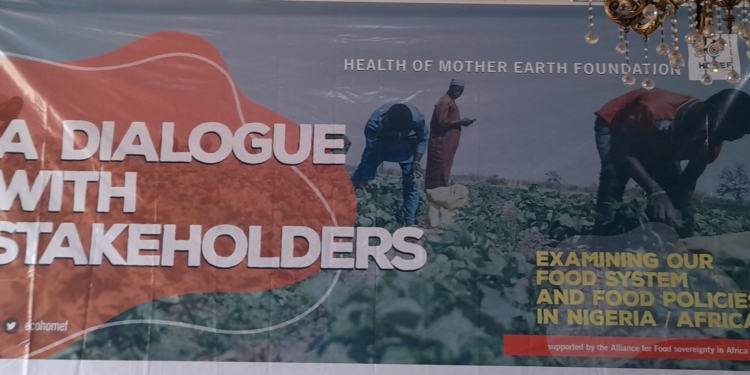Nnimmo Bassey, Top Environmentalist and Director, Health of Mother Earth Foundation, HOMEF has revealed that if the Plant Variety Protection (PVT) Bill is passed into law by the National Assembly, it would spell disaster for agriculture and farming systems in Nigeria.
Bassey made the disclosure while giving his welcome address at the Stakeholders dialogue on Food Policies, organized by HOMEF.
Bassey explained that, “the bill aligns with the International Convention for the Protection of New Varieties of Plants (UPOV), a patent driven system formulated without the participation of African countries and designed by “countries where agriculture is a business rather than a way of life.” Such countries have a tiny fraction of the population involved in agriculture which is of the industrial type.
“Once in place, farmers will be criminalised if they duplicate or share seeds registered under this law. Proponents of the bill tout the roaring success of UPOV and often cite Vietnam as a country where UPOV brought about dramatic increases in farmers’ productivity.
“Although the proponents of this bill insist that genetically modified organisms (GMOs) will not creep into the food system as part of the new plants varieties, there are some worrisome provisions in it.”
The HOMEF director also noted that, “the bill makes no space for civil society representation and none for smallholder farmers except where it mentions “the registered farmers’ association.” Saying “the” rather than “a” suggests that the registered farmers’ association is already known to the drafters of this Bill.”

He thereafter demanded that the bill be withdrawn, saying, “this is the time for the bill to be withdrawn and returned to the drawing board for real public consultations and inclusion of the views of small-scale farmers who risk being criminalised through this piece of legislation.
“Nigeria needs an omnibus law that covers plants, animals, and fishes. Rather than approaching food in silos, promoting the interest of seed oligarchs and speculators, we should be looking at how to create spaces for the celebration of traditional ecological knowledge and technologies and at how to amplify our traditional diets and cuisine.
“We should look for ways to encourage research into these as a sure pathway to secure our food systems for now and for the future.
“We should never forget that food is a human right, and no one should be subject to the indignity of chronic hunger and malnutrition. Our composite farms offer foods needed for balanced nutritious diets rather than what plantation monocultures or green deserts offer.”
Bassey also stressed that, “this is the time to build a food policy anchored on agroecology. It is time to support our farmers with adequate extension services, infrastructure, finance, and market access.
“Some of the identified problems would not exist if the gap between policy making and the people were closed. The collapse of the local government structures and the limited concern of state governments to the fortunes of small holder farmers compound the problem.
“This gap is accentuated by the fact that small scale farmers are not consulted in policy making processes. As the research commissioned by HOMEF has shown, the government should ensure that food policies are coherent, implementable and that they address the challenges in the food sector.
“We stress again that farmers, consumers, and other stakeholders in the food sector should fully participate in decision and policy making in this regard,” he added.

